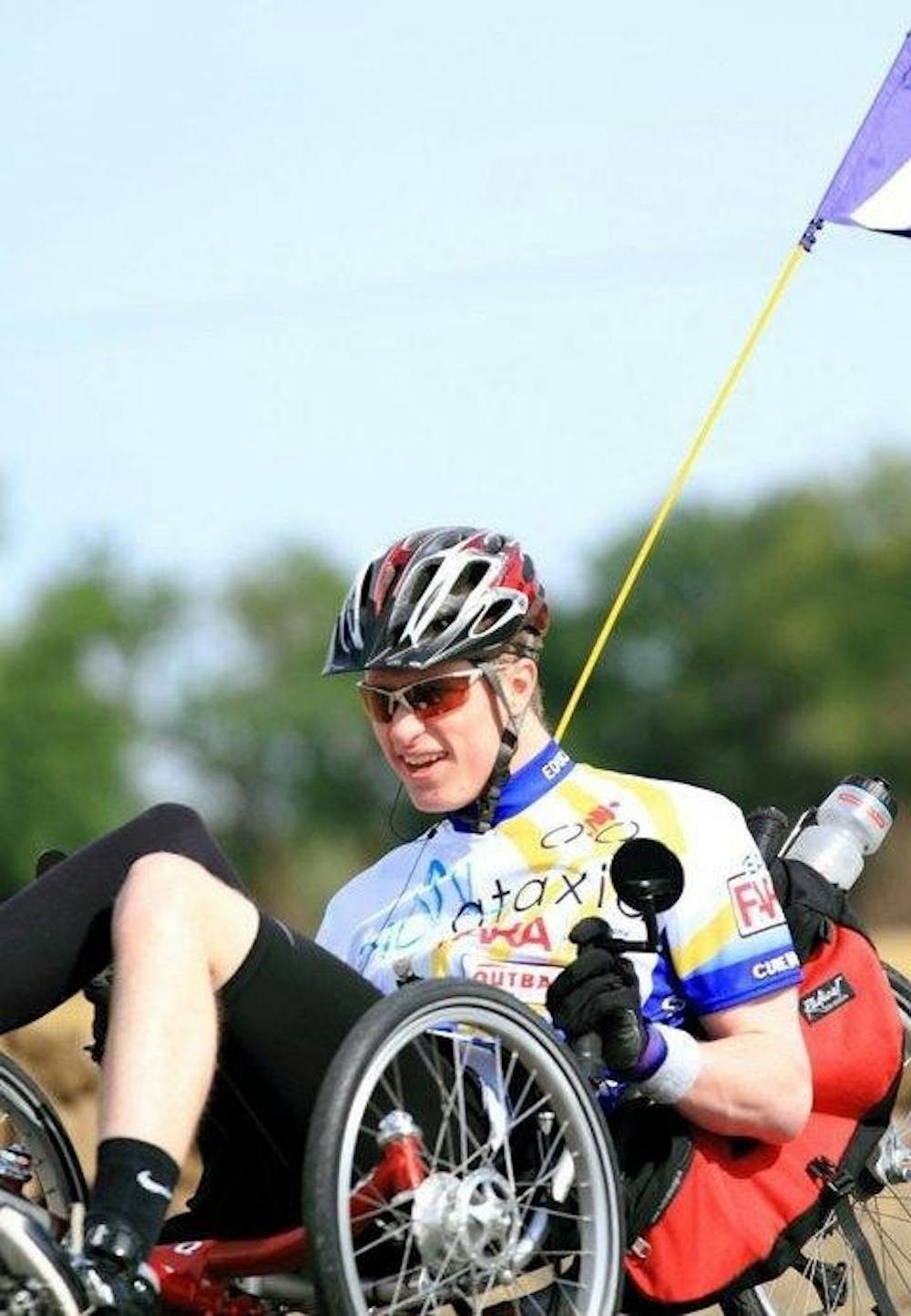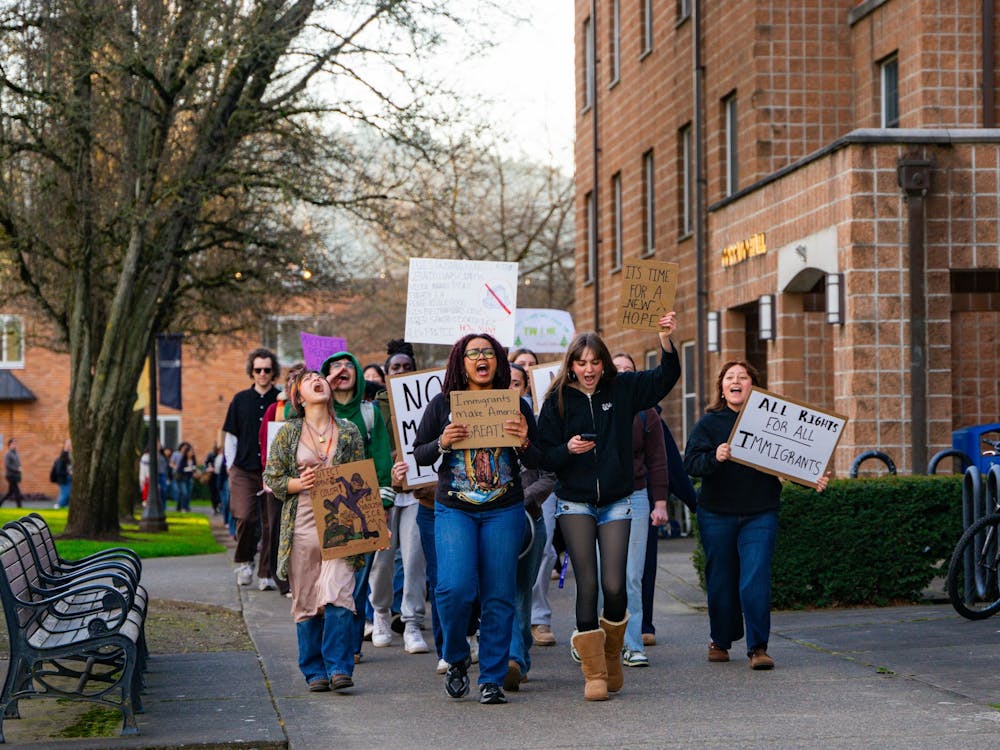Junior Sam Bridgman refuses to let Friedreich’s Ataxia hold him back
(-- The Beacon)
By Laura Frazier Features Editor frazier13@up.edu
The tattoo wraps around his wrist, the red stitches like seams on a baseball paralleling two powerful statements in deep black ink: Seek A Miracle, Impossible Is Nothing.
For junior Sam Bridgman, a miracle would be a cure for a disease that affects only 1 in 50,000 people in the United States.
In spite of this, Bridgman refuses to let Friedreich's Ataxia, a hereditary and degenerative neuromuscular disease, define him.
Since his diagnosis at 15, this resolution has never faltered.
"I have the attitude, and I still do, that I don't care," he said. "I'm just going to do whatever makes me happy."
An avid athlete, Bridgman would spend hours playing baseball with his dad until he got it right.
"Sam was really, really tenacious," says his girlfriend of a year and a half, junior Molly Billingham. "He just wanted it so bad."
But during the spring of his freshman year of high school, Bridgman found himself repeatedly stumbling into doors and tripping. He was overwhelmingly fatigued. Then he didn't make the baseball team, triggering his search for an answer.
He tried acupuncture, a chiropractor and a scoliosis specialist.
It took a neurologist and blood test to finally diagnose him with Friedreich's Ataxia, a disease that attacks the body's nervous system and affects its ability to move. The neurologist told him that in his 36 years of work, Bridgman was only his fourth case.
At first it didn't affect him much. During high school and his first year of college he was still able to walk. But now in a wheelchair, Bridgman sees how the progression has hit him, regardless of his strength.
"My nerves are in a sense stupid," he said. "They are losing everything they have. They don't know how to use their strength."
But when he bikes, impossible is nothing. Biking is something his body still allows him to do.
In spring of 2008, Bridgman took off from Sacramento, Calif. and kept pedaling until he hit Las Vegas, Nev. It took him two weeks. During that time, he raised $100,000 for Friedreich's Ataxia research.
For the 560-mile trip Bridgman rode with the Ride Ataxia program, which works with the Friedreich's Ataxia Research Alliance (F.A.R.A.) to raise money to beat the disease. Bridgman has done several rides, normally bringing along his family and friends.
Biking gives him a way to get out and explore. It helps him to fill the void.
"It makes me feel like my legs and body are alive," he said. "And that is a great feeling."
Another thing that gives him that feeling is baseball.
Under the arc of lights at Safeco Field, Bridgman flung the pitch towards home plate.
It never hit the ground, landing squarely in the sweet leather of the catcher's glove.
"High and outside," he said.
Thanks to the Make-A-Wish foundation, Bridgman had spent that August day in 2008 with his heroes in the Seattle Mariner clubhouse, taking batting practice and stretching with the team. The Mariners took the field soon after, beating the Twins with a walk-off home run. Now, Bridgman interns for the company. He hands out free merchandise to the crowd.
Billingham claims you could ask him about any past World Series, and he would know the teams, the final score and the memorable moments.
Junior Kunal Madan, Bridgman's housemate, has to beg him to turn on anything besides ESPN.
"Sometimes I just have to say ‘Come on Sam, can't we watch something else?'' he said. "He's addicted to sports."
For Bridgman, it's simple.
"Even though I can't play baseball I wanted to still be involved," Bridgman said.
Though he admits it's hard for him, facing his limits and aching every day with the pain of what he's lost.
"With the late onset of my symptoms, I know what it feels like to do everything," he said. "I know what it feels like to swing a bat, wrap a double down the line, slide into second and pop up and just scream at the top of my lungs. But now when I try to do those things I can't."
But it's still impossible to tear him away from the sport he loves. In high school, he devoted himself to being the team manager. He talked to the baseball coach at every college he applied to, landing as the self-titled social media manager for the Pilots.
He also has access to the team weight room and trainer. Not only does working out help him to cope, but it's also how he met Billingham.
At first she was drawn to how personable and social he was. Now she's come to love his infectious attitude.
"I like his activism, the way he can always put a smile on. He wants so badly to be a good person," she said.
Gwynn Klobes, UP's Director of Professional Development, met Bridgman his freshman year. She has since bonded with him and his family.
"He brings joy to life," she said. "I have the deepest respect for him and the adversity he goes through everyday in the most gracious and positive way."
Billingham agrees.
"He has such a good sprit," she said. "He has a great laugh. He goes out of his way to do good things for people."
Forever visible on his skin, "impossible is nothing" is his resounding life motto. And everyone who knows Bridgman can see it too.
It's more than a simple slogan for a kid who loves sports.
It's what he tells himself when he is drained and exhausted, or when he remembers what it felt like have wind hit his face as he tore down a black diamond ski slope.
It's a reflection of how Bridgman takes everyday, with a tangible determination and vibrancy.
It's something we never forget.
(-- The Beacon)








